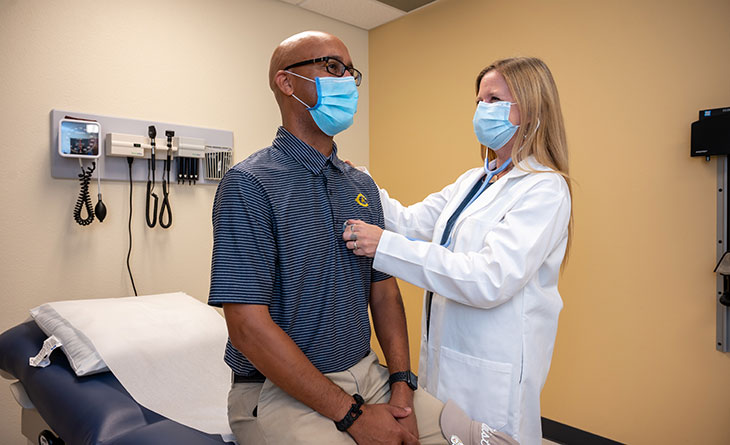Doctor: Comprehensive Treatment and Treatment for All Individuals
Doctor: Comprehensive Treatment and Treatment for All Individuals
Blog Article
Recognizing the Necessary Role of Medical Care in Comprehensive Health And Wellness Monitoring and Illness Prevention Strategies
The important duty of health care in comprehensive health and wellness monitoring and disease prevention approaches can not be overemphasized, as it works as the structure for effective health care distribution. By prioritizing precautionary treatment and cultivating enduring patient-provider relationships, medical care practitioners are distinctively placed to resolve individual health requirements while additionally affecting wider area wellness outcomes. The intricacies and obstacles encountered in the implementation of these methods elevate essential questions concerning just how ideal to maximize key treatment's efficiency. What innovative methods might enhance its influence on both individual and public health?
Definition of Medical Care
Although the idea of health care may differ throughout different medical care systems, it essentially refers to the initial point of call for individuals within the medical care continuum. Health care includes a wide variety of services, consisting of precautionary treatment, medical diagnosis, treatment, and management of persistent problems. It is defined by its extensive, obtainable, and worked with method, guaranteeing patients obtain all natural care tailored to their specific needs.
Main treatment service providers, usually family doctor, internists, or doctors, play an important function in developing continuous patient-provider partnerships. This continuity of care fosters trust fund and facilitates far better health results via regular tracking and customized treatments. The focus on a patient-centered approach enables the factor to consider of social, economic, and psychological variables that affect health.
Additionally, main treatment works as a vital element in browsing the medical care system, guiding clients via specialized services when necessary. By functioning as a main center for wellness monitoring, medical care not only addresses prompt medical issues however likewise highlights the value of general wellness and safety nets. Therefore, its meaning prolongs beyond simple treatment to encompass a detailed framework for health and wellness promotion and disease avoidance.
Advantages of Preventive Treatment
Precautionary care deals many benefits that substantially boost specific and community health and wellness outcomes. By focusing on the prevention of conditions and health and wellness problems before they arise, preventative treatment minimizes the incidence of severe wellness conditions, thereby decreasing medical care expenses in time. Early detection via routine screenings and analyses permits timely treatments, which can avoid the progression of conditions, resulting in enhanced high quality of life for patients.
Additionally, precautionary treatment promotes wellness education and awareness, equipping individuals to make enlightened choices about their way of livings and health and wellness actions. This positive strategy motivates normal examinations, inoculations, and health screenings, which not just benefit people but additionally add to the general health of the neighborhood. By decreasing the worry of chronic diseases and protecting against break outs of transmittable diseases, precautionary treatment plays a crucial function in boosting public health and wellness.
In enhancement to boosting private wellness outcomes, precautionary treatment cultivates a more effective medical care system by minimizing the requirement for considerable therapies and hospitalizations. Eventually, spending in preventative care is vital, as it promotes healthier populations, reduces wellness differences, and guarantees much better source appropriation within the medical care system.
Role in Persistent Disease Management
The proactive methods used in preventative treatment are instrumental in the management of chronic diseases, which typically need continuous interest and resources. Health care carriers play a crucial duty in this context, offering as the initial factor of call view for people with persistent problems such as diabetes mellitus, high blood pressure, and cardiovascular disease. They contribute in developing individualized management plans that encompass regular surveillance, drug monitoring, and way of living modifications.

In addition, health care service providers typically utilize innovation and information analytics to track patient progress and identify potential complications early. This proactive surveillance boosts person involvement and encourages people to take an energetic duty in their wellness monitoring. Eventually, the combination of main care into persistent illness management cultivates better high quality of life and decreases the burden on medical care systems.
Patient-Provider Relationships

In addition, a durable patient-provider relationship boosts person involvement and self-management. Carriers who spend time in recognizing their individuals' backgrounds, preferences, and inspirations are much better outfitted to support them in handling their problems. This individualized approach can lead to improved health outcomes, as people are most likely to comply with suggestions when they feel valued and understood.
Furthermore, continuity of treatment plays a substantial function in strengthening these relationships. Normal interactions between people and service providers facilitate recurring assessment and modifications to treatment strategies, which is vital for handling chronic conditions successfully. This continuity not only advertises much better health end results however likewise reduces medical care expenses by minimizing the demand for immediate interventions.
Influence on Neighborhood Wellness
Strong patient-provider relationships dramatically influence community wellness results, as they contribute to a much more involved and notified populace. primary care provider near me. When patients feel connected to their health care suppliers, they are most likely to seek preventative services, abide by therapy plans, and join health-promoting actions. This engagement promotes a society of health, where individuals prioritize their health and the wellness of their area
Furthermore, efficient communication between patients and providers boosts wellness proficiency, equipping individuals to make informed choices concerning description their care. This increased understanding can lead to lowered prices of chronic diseases, as people ended up being positive in managing their wellness. Furthermore, strong partnerships promote the recognition of community-specific wellness difficulties, enabling providers to customize interventions that resolve regional needs.
In addition, medical care acts as a vital access factor for health sources, linking patients with needed services and assistance networks. This detailed approach not just improves specific health yet also reinforces neighborhood communication, as citizens work collaboratively to attend to health variations. Overall, the effect of durable patient-provider connections expands beyond the facility, fostering healthier areas and adding to a lasting healthcare system.
Final Thought
In summary, medical care is fundamental to efficient health administration and condition prevention. By emphasizing preventative treatment and chronic condition management, main treatment facilitates early discovery and individualized therapy strategies. Strong patient-provider connections foster trust fund and enhance adherence to health and wellness referrals. Ultimately, the assimilation of medical care into neighborhood health and wellness methods leads to improved wellness end results and reduced healthcare costs, highlighting its important function in advertising total area health.
Report this page